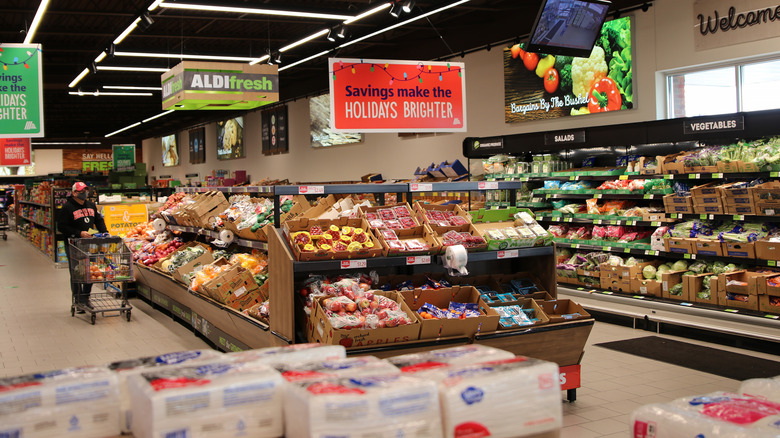Aldi Vs Costco: Which Store Carries More Products?
When Daily Meal assembled a ranking of the best grocery store in every state, two chains inspired some serious loyalty from the pollees — Aldi and Costco. Regardless of which you prefer, there's a good chance that you have some strong feelings about them. Did you ever wonder, though, which of these stores actually has more products and a wider selection?
Before we get into numbers, let's start with a base comparison. Both Aldi and Costco have only a fraction of the products carried by the average grocery store – today, most standard stores stock anywhere from 40,000 to 50,000 different items.
Now, let's hop on over to Costco. Founded in 1976, Costco now carries just around 4,000 unique items. A typical Aldi, meanwhile, hovers around about 2,000 different products. If that makes it sound like there's no way you want to give either a try, here's some food for thought.
When it comes to square footage, Costco is a behemoth
Although Costco only carries about twice the number of products as Aldi, the square footage of a Costco is almost mind-numbingly huge. Stores average around 140,000 square and range from 76,00 square feet to over 240,000 square feet.
It doesn't seem like Costco would need massive stores with only a relatively small number of products, but there are a few reasons for their size. For starters, there's those huge shopping carts that require wide aisles. The stores have to be able to handle tons of customers, to the average tune of around 300 people walking through the doors of each store each hour on the weekends.
Costco is arguably most famous for its Kirkland Signature range, exclusive products made by major brands. There are around 550 different items in that brand. Together, they brings in about 23% of the brand's revenue.
Aldi uses small spaces and streamlined offerings
Meanwhile, Aldi's corporate offices have specific requirements put in place for their stores: They're just around 18,000 square feet and are required to have space for at least 85 parking spots. That works for their relatively small number of products, and only about 900 of those are core products that are always in stock. The rest are regionally sourced, in-season items or rotating overstock from various sources.
Aldi, however, has grown a lot since its early days as a relatively small, European grocery chain. When the first UK store opened in 1990, it only sold around 600 products. One of the reasons that Aldi and Costco can carry a relatively small number of products is that they streamline offerings. You're not going to find 12 different kinds of peanut butter on the shelves, there are no endless aisles filled with dozens of cola brands, and you're not going to find an overwhelming variety of anything. But, that's all right, because what you do want? It's there.


